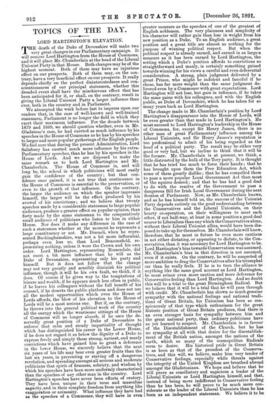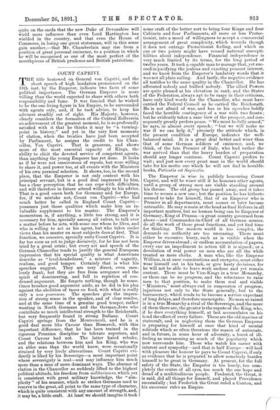TOPICS OF THE DAY.
LORD HARTINGTON'S ELEVATION. THE death of the Duke of Devonshire will make two very great changes in our Parliamentary campaign. It will remove Lord Hartington from the House of Commons, and it will place Mr. Chamberlain at the head of the Liberal Unionist Party in that House. Both changes may be of the highest moment. Both of them may have an injurious effect on our prospects. Both of them may, on the con- trary, have a very beneficial effect on our prospects. It really depends chiefly on the perfect disinterestedness and con- scientiousness of our principal statesmen, whether this dreaded event shall have the mischievous effect that has been anticipated for it, or shall, on the contrary, result in giving the Liberal Unionist Party a larger influence than ever, both in the country and in Parliament.
We attempted the week before last to impress upon our readers that, in the case of well-known and well-trained statesmen, Parliament is no longer the field in which they exert their maximum influence. For the decade between 1879 and 1889, we should question whether, even in Mr. Gladstone's case, he had exerted as much influence by his speeches in the House of Commons as he has by his speeches to larger and more popular gatherings of the English people. We feel sure that during the present Administration, Lord Salisbury has exerted much more influence by his extra- Parliamentary speeches, than he has by his speeches in the House of Lords. And we are disposed to make the same remark as to both Lord Hartington and Mr. Chamberlain. The House of Commons is, and will long be, the school in which politicians will most easily gain the confidence of the country ; but that con- fidence once gained, it is not true that continuance in the House of Commons is essential to the preservation, or even to the growth of that influence. On the contrary, the larger the audience on which the speaker impresses himself, the larger will be the effect produced by his avowal of his convictions ; and we believe that twenty speeches made by a considerable statesman to large popular audiences, produce a greater effect on popular opinion, than forty made by the same statesman to the comparatively small audience of politicians who listen to him in either House. Nor does it make any difference in the case of such a statesman whether at the moment he represents a large constituency or not. Mr. Disraeli, when he repre- sented Buckinghamshire, was not a bit more influential, perhaps even less so, than Lord Beaconsfield, re- presenting nothing, unless it were the Crown and his own order. Lord Hartington, representing Rossendale, did not exert a bit more influence than he will as the Duke of Devonshire, representing only his party and himself. But it does not follow that the change may not very greatly and sensibly diminish his political influence, though it will be his own fault, we think, if it does. Of course if he gives way to the temptations of leisure and wealth, if he appears much less often in public, if he leaves his colleagues without the full benefit of his counsel, if he deserts the public platform and does not use all the modest opportunities which even the House of Lords affords, the blow of his elevation to the House of Lords will be a most serious one. But if, on the contrary, he throws into the general political work of the country all the energy which the wearisome sittings of the House of Commons will no longer absorb, if he uses the de- servedly great position of a Duke of Devonshire to enforce that calm and steady impartiality of thought which has distinguished his career in the Lower House, if he does not regard it as below the dignity of a Duke to express freely and simply those strong, earnest, and manly convictions which have gained him so great a deference in the lower House, we sincerely believe that the next six years of his life may bear even greater fruits than the last six years, in preventing or staving off a dangerous revolution, and spreading amongst all serious and moderate politicians that spirit of firmness, sobriety, and wisdom by which his speeches have been more uniformly characterised than the speeches of any other man in the country. Lord Hartington's speeches have never been efforts of oratory. They have been unique in their terse and masculine sagacity, and in their complete freedom from anything like exaggeration or animosity. What influence they have had as the speeches of a Commoner, they will have in even greater measure as the speeches of one of the greatest of English noblemen. The very plainness and simplicity of his character will rather gain than lose in weight from his new position as a Duke. To an English audience, a great position and a great title are almost as nothing for the purpose of winning political respect. But when the political respect is already earned, and earned in as large a. measure as it has been earned by Lord Hartington, the setting which a Duke's position affords to convictions so straightforward and manly, is certainly something gained towards winning for his views a careful and even deferential consideration. A strong, plain judgment delivered by a great Prince, who might be indolent and fanciful if he chose, has far more weight than the same judgment de- livered even by a Commoner with great expectations. Lord Hartington will not lose, but gain in influence, if he takes the same pains with his colleagues, and with the English public, as Duke of Devonshire, which he has taken for so many years back as Lord Hartington.
The change made in Mr. Chamberlain's position by Lord Hartington's disappearance into the House of Lords, will be even greater than that made in Lord Hartington's. He must succeed to Lord Hartington's leadership in the House of Commons, for, except Sir Henry James, there is no other man of great Parliamentary influence among the Liberal Unionists, and Sir Henry James's reputation is too professional to admit of his being regarded as the head of a political party. The result may be either very good or very bad, but we incline to think that it will be the former. Mr. Chamberlain is at present, we think, a little distrusted by the bulk of the Tory party. It is thought that he has tried too much to force their hands ; that he has brought upon them the Free Education Act, which some of them greatly dislike ; that he has compelled them to pass a more popular Local Government Act than most of the squires desired ; and that he has had a good deal to do with the resolve of the Government to pass a dangerous Bill for Irish Local Government during the next Session of Parliament. Now, as Mr. Chamberlain knows,. and as he has himself told us, the success of the Unionist Party depends entirely on the good understanding between the Conservatives and the Liberal Unionists, on their hearty co-operation, on their willingness to meet each other, if not half-way, at least in some position a good deal nearer to Liberalism than any which the Conservatives alone, without their Liberal Unionist allies, would have been dis- posed to take up for themselves. Mr. Chamberlain will know,. therefore, that he must in future be even more cautious in not either dictating, or appearing to dictate, to the Con- servatives, than it was necessary for Lord Hartington to be. Lord Hartington's bias towards Conservatism was assumed. Mr. Chamberlain's bias in that direction is not assumed, even if it exists. On the contrary, he will be suspected of more ambition to drag the Conservatives after his triumphal car than he really feels. If he is to turn the alliance to anything like the same good account as Lord Hartington, he must evince even more caution and more deference for Conservative feeling than Lord Hartington. And no doubt this will be a trial to the great Birmingham Radical. But we believe that it will be a trial that he will pass through with credit. Mr. Chamberlain has shown so much genuine sympathy with the national feelings and national tradi- tions of Great Britain, his Unionism has been so con- spicuously of that type which enthusiasm for the great historic position of Great Britain produces, that there is an even stronger basis for sympathy between him and the great national party, than ordinary politicians have as yet learned to suspect. Mr. Chamberlain is in favour of the Disestablishment of the Church, but he has no sympathy at all with that desire for the disestablish- ment of the British nation, amongst the nations of the earth, which so many of the cosmopolitan Radicals seem to desire. His historical pride in Great Britain is as keen as that of the proudest of the Conserva- tives, and this will, we believe, make him very tender of Conservative feelings, especially while threats against the integrity of the United Kingdom are breathed abroad amongst the Gladstonians. We hope and believe that he will prove as conciliatory and sagacious a leader of the Liberal Unionists as Lord Hartington himself, and that instead of being more indifferent to Conservative feeling than he has been, he will prove to be much more con- siderate as the leader of the Liberal Unionists than he has been as an independent statesman. We believe it to be quite on the cards that the new Duke of Devonshire will wield more influence than even Lord Hartington has wielded in the country, and that even the House of Commons, in losing one great statesman, will in this sense gain another,—that Mr. Chamberlain may rise from a position of great personal eminence, to a position in which he will be recognised as one of the most perfect of the mouthpieces of British prudence and British patriotism.



































 Previous page
Previous page